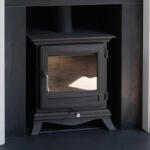
Coffee Logs UK – Q & A
Nowadays, calor gas bottles, logs and coal aren’t the only home fuels on the market. A wide variety of alternative, highly-efficient fuels are now available. Of course, traditional, tried-and-tested fuels have clear advantages for buyers like you: when you opt for a well-known fuel, you can feel confident that you are choosing a reliable product that will perform exactly as you expect it to. However, if you do want to try a new and slightly unusual type of fuel, you may wish to consider using bio bean coffee logs. If you haven’t heard of this type of fuel before, or if you’re not certain it’s right for you, don’t worry. We’ve answered some of the questions you might have about this fuel so that you can decide if you want to try it out or not.
1. How are bio bean coffee logs made?
Bio bean coffee logs are made by compressing recycled coffee grounds into dense, flammable, log- like bricks. Because the logs are made from materials that would otherwise be thrown away, they help reduce waste and have very little environmental impact. Only burnable material is used to create coffee logs, meaning that each log contains very few impurities. As a result, they produce very little CO2. However, it’s worth noting that real wood logs are also functionally carbon neutral. This is because new trees are grown to replace the ones that are turned into logs. These trees then take CO2 out of the atmosphere, balancing out the CO2 emissions from the burned logs. If you want to help reduce waste, coffee logs are a great fuel for you. If you’d rather focus on being carbon neutral, you might be better off sticking with traditional logs.
2. Which devices can use coffee logs?
Bio bean coffee logs can be used as a substitute for normal logs. This means they can be burned in most fires, boilers and stoves that are designed to work with regular logs. However, before you invest in coffee logs, it’s worth checking to make sure that your device is designed to take any type of log, not just wooden logs of a particular type. You should also be aware that coffee logs generally can’t be used with devices that are specifically designed to work with coal. Just remember: if you have an ordinary wood-fuelled fireplace, stove or boiler, you should be able to switch to coffee logs easily. If you currently use coal or a similar fuel, you may not be able to.
3. Do coffee logs burn differently to traditional fuels?
Coffee logs produce less smoke than normal logs and coal. They also don’t produce the same woody aroma as traditional logs (as you might predict, they smell slightly of roasting coffee instead). Other than that, they burn normally. If you don’t mind exchanging a woody aroma for a coffee-like aroma, bio bean coffee logs might be right for you. If you’re particularly attached to the scent of traditional logs burning in an open fireplace, coffee logs might not be the right fuel.
Here at London Gases, we’re committed to helping each of our customers choose the right fuel for them. We hope these questions have helped you decide whether coffee logs are the best choice for you. If they are, you can order them from us. Check out our product pages today.
